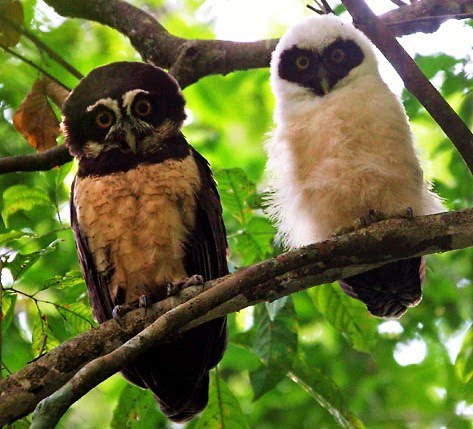Pulsatrix perspicillata
Common name:
spectacled owl (en); murucututu (pt); chouette à lunettes (fr); lechuzón de anteojos (es); brillenkauz (de)
Taxonomy:
Order Strigiformes
Family Strigidae
Range:
This species is found from southern Mexico, through Central America and large parts of northern South America under the recess of the Andes, all the way to northern Argentina.
Size:
Spectacled owls are 43-46 cm long and have a wingspan of 76-91 cm. Females tend to be larger than males, weighing 760-980 g while males weigh 590-760 g.
Habitat:
Spectacled owls live near water in rainforest and woodlands. They can be found from sea level to elevations of 1.600 m.
Diet:
They mostly hunt almost exclusively at night, mostly taking mice and insects. They are also known to eat crabs, bats, possums, skunks, frogs and smaller birds no larger than a pigeon.
Breeding:
The spectacled owl breeds in April-October. They nest inside tree cavities, where the female lays 1-2 eggs. The eggs are incubated by both parents for 34-35 days. Only 1 chick survives, being mostly fed by the female, with some help from the male, and fledge 5-6 weeks after hatching, but often continue to dependent on their parents for up 1 year
Conservation:
IUCN status – LC (Least concern)
This species has a very large breeding range and a global population of 500.000-5.000.000 individuals. The population is suspected to be stable in the absence of evidence for any declines or substantial threats, so it is not considered threatened at present.








